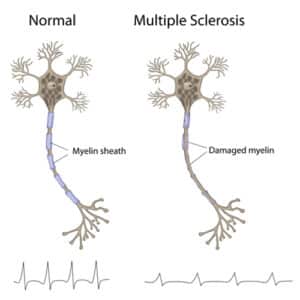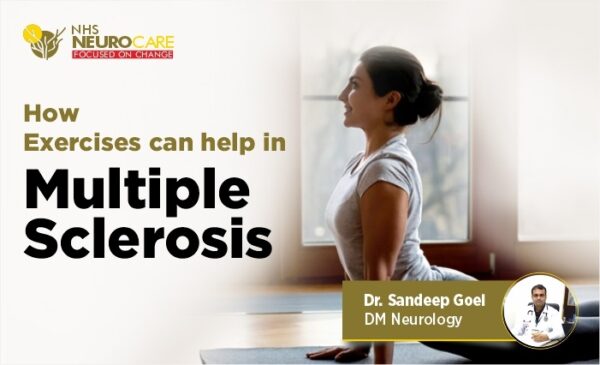In Multiple Sclerosis How Exercises Can Help
Multiple sclerosis or MS is a condition where the immune system destroys the nerves’ protective covering. It is a brain and spinal cord condition that could be incapacitating (central nervous system)
In this blog we have discussed, how exercises are beneficial for MS and if there are any risks involved for MS patients. If you live in or around Jalandhar, Punjab, Multiple sclerosis you will be able to find NHS Neuro Care, a unit of NHS Hospital, Jalandhar through a web search for Multiple sclerosis specialists near me or the Best Multiple sclerosis specialist near me where you can consult with our expert and get the right treatment plan for this condition.

What kinds of exercises are suggested for Multiple sclerosis patients?
Conventional exercise techniques include aerobic training, progressive resistance training, and flexibility training (stretching, range of motion) & strength training.
To improve movements or functions, task-specific training can also be carried out, typically under the close supervision of a rehabilitation therapist:
- Gait training exercises are performed to optimize a person’s gait pattern, with the goal of improving mobility
- A vestibular rehabilitation programme has been demonstrated to positively impact balance deficits, a very common issue, in MS patients.
- In addition to balance deficits, many individuals with MS report dizziness or vertigo that can negatively impact their daily lives. Balance issues can be improved, and dizziness or vertigo complaints can be decreased with structured intervention from a vestibular rehabilitation specialist.
The superiority of one training method over the others is not clearly demonstrated by the available data. According to each person’s demands, several forms of exercise are typically blended in fitness programmes. Based on the patient’s symptoms and unique needs, a rehabilitation therapist can assist in developing an appropriate exercise regimen.
Even though the frequency, duration, and intensity of training sessions are frequently lower in MS than in the general population, many of the exercises are the same as those advised for the general populace. However, the contents may need to be modified to ensure feasibility and safety in the presence of neurologic impairments. The same is true for fitness equipment: for people who have gait and balance issues, using a stationary bike instead of a treadmill for aerobic training is frequently advised.
Virtual reality gaming technology that is readily available on the market can serve as a motivating tool for fitness by offering quick feedback and quantifiable, attainable goals.
Why is exercise necessary for MS patients, and is it effective?
Exercise is advised for everyone to maintain and enhance fitness and overall wellness, and those with MS are no different. People with MS are physically inactive, much less than the general population, according to research. Fatigability and frailty are exacerbated by physical deconditioning brought on by low exercise levels.
Also, a growing body of research indicates that exercise improves walking and balance, lessens the intensity of many MS symptoms like fatigue and depressive symptoms, and improves quality of life. Many reviews and meta-analyses have been published, and while methodological flaws in the exercise studies under examination are acknowledged, overall, the magnitude of change attributable to exercise is minor but significant. Also, most exercise research includes participants who have mild to severe physical impairments. According to several research and evidence from various demographics, exercise may enhance cognitive function.
Comorbidities, such as obesity, cardiovascular disease, and musculoskeletal conditions, have been linked to increased levels of impairment in MS patients. Exercise is advised in the treatment of several of these comorbidities, which may hence indirectly aid in the management of MS.
Do exercises pose a safety risk for people with MS?
Exercise does not worsen MS symptoms, as is now widely accepted. Exercise may, however, temporarily exacerbate pre-existing MS symptoms like weakness, paresthesia, or visual disruption. An increase in body temperature, which can be reduced by utilizing fans or cooling clothing, may contribute to this deterioration. If it takes the person more than 2 hours to return to baseline after an exercise session, it can also be essential to reduce the intensity and duration of the exercise.
Musculoskeletal pain brought on by exercise may also call for a change in the exercise programme. The training regimen should be modified to lessen the chance of falling. Schedule your appointment with one of the best doctor for multiple sclerosis in India at NHS Neuro Care A Unit of NHS hospital.
Do MS patients have any workout recommendations?
There aren’t enough regulations for those with severe disabilities, especially non-ambulatory people. The exercise programme must be created and recommended on an individual basis to take an individual’s capabilities, impairments, and environmental restrictions into consideration. At NHS Neuro Care, we have a team of Multiple sclerosis specialists in Jalandhar and are reliable to assist you in the same.


Thanks I’ve been seeking for information on this topic for a long time and yours is the greatest I’ve found. However, what about the bottom line? Are you sure about the supply?
Fantastic beat I would like to apprentice when you amend your web site how may i subscribe for a blog site The account helped me a lot I was a little familiar of this your broadcast presented nice clear concept